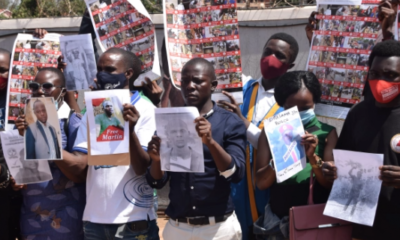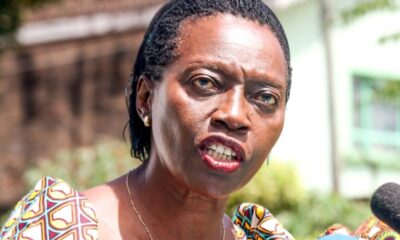
Civil society calls for withdrawal of proposed Govt tax measures – The Black Examiner
Summary:
The Tax Justice Alliance Uganda has disagreed with most of the proposals in the five tax amendment bills that were recently tabled before parliament as part of the 2024/2025 budget process.
The Tax Justice Alliance Uganda has disagreed with most of the proposals in the five tax amendment bills that were recently tabled before parliament as part of the 2024/2025 budget process.
The new tax measures are contained in the Income Tax Amendment Bill, 2024, the Excise Duty Amendment Bill, 2024, the Value Added Tax Amendment Bill 2024, the Stamp Duty Tax Amendment Bill 2024, and the Tax Procedure Code Act Amendment Bill 2024.
The amendments are aimed at increasing tax revenue to enable the government to bridge the gap that has been left by the decline in external assistance as well as reducing sources of international finance.
This also comes as the government intensifies the mobilization of resources to cater to the rise in debt servicing levels and loan repayment obligations.
The Ministry of Finance, Planning and Economic Development has proposed a resource envelope of 58 trillion shillings next financial year, an increase of about 6 trillion shillings from the current budget, with 31 trillion shillings coming from domestic resources, mainly taxes and non-tax revenues.
Mark Mutumba, the Tax Policy Analyst at SEATINI Uganda said the government has made remarkable proposals that could significantly increase collections but that others could have negative effects on the economy.
Civil society groups are opposed to the taxation of non-business assets, a provision that introduces a 5 percent tax charge on proceeds obtained from the disposal of a non-business asset like land and buildings in a municipality or city.
The group says taxing business assets like land and buildings in a municipality or city could discourage investment in the land “due to the perceived additional costs of acquisition,”.
The group is of the view that small and medium enterprises are likely to suffer more in getting places to set up businesses. It observes that there is land at industrial parks, it is always allocated by large organizations.
Mutumba who presented a joint statement, added that the proposal creates ambiguity because it does not explain some terms like “Principal Place of Residence,” while also it creates unfairness between property owners in the urban areas and those in rural areas.
Others present included Akina Mama wa Africa, Civil Society Budget Advocacy Group, Uganda Debt Network, ACODE and the Uganda Parliamentary Network on Illicit Financial Flows and Tax Justice, as well as the the Federation of Small and Medium Enterprises.
The group also welcomed the proposed tax exemption on private equity and venture capital funds, which is aimed at encouraging more businesses to access cheap and patient capital from such sources.
These are investors who take an interest in a business and offer to put in more capital to grow it to recoup their investment later when the business has grown.
However, while this is commendable, civil society is worried that it might be misused since currently there are no regulations under the Capital Markets Authority Act to guide the registration process of such investment companies.
They want it rejected until there are proper regulations in place, as this absence of regulation could result in redundancy in the law and facilitate revenue leakages.
They also recommend withdrawing the proposal to introduce tax exemptions on income earned from the disposal of government securities on the secondary market, adding that clear guidelines are essential to prevent unintended consequences like increased government borrowing and diversion of capital from key sectors.
However, they say, this will encourage investors to go for government securities and deny capital flows into another vital area of the economy.
The government also proposed to waive taxes on the establishment of specialized investments like health facilities, to increase access to proper healthcare by Ugandans.
However, presenting the joint civil society statement, Mutumba said there is a need to define the term “specialized hospital” for tax purposes and also put in place measures to ensure that these beneficiary facilities will also benefit all sections of the population.
The Civil Society also opposed the increase in the excise duty on essential commodities like fuel and drinking water, saying that this would affect the livelihoods of Ugandans.
Mutumba wondered why excise duty, which is aimed at discouraging import or manufacture of hazardous materials was now being used to discourage consumption of essential items.
The civil society also proposed some alternative tax measures to cover the gap left by their demand to scrap some measures, and these include curbing illicit financial flows by fighting smuggling, corruption and other illegal practices in businesses.
They are also calling for the operationalization of the Mining and Mineral Act 2022, which provides for the registration of artisanal miners.
This, according to Mark Otile, Research Officer at ACODE, would increase tax revenues with these small investors contributing.
The Tax Justice Alliance also called for the expeditious implementation of the rationalization of government ministries, departments, and agencies to save money lost through duplication of roles and inefficiency.
In the same way, they want a faster implementation of the Tax Expenditure Governance Framework and the Tax Expenditure Rationalization Plan that aims at revising the tax incentives regime which has been blamed for unnecessarily denying the government billions of shillings in due revenues.
They also condemned the persistent supplementary budget requests by the government and the continued deepening of the tax base instead of finding measures to widen it.
WhatsApp Follow Button
Follow @examinerug
Your Page Title
The Black Examiner®.
We come to you.
Want to send us a story or have an opinion to share? Send an email to editorial@examiner.co.ug or Join Our WhatsApp CHANNEL
https://examiner.co.ug/news/national/civil-society-calls-for-withdrawal-of-proposed-govt-tax-measures/?utm_source=rss&utm_medium=rss&utm_campaign=civil-society-calls-for-withdrawal-of-proposed-govt-tax-measures
News
Ugandan Citizen Abducted, Held in Secret Detention for Three Months, Sparks Outrage and Calls for Justice

A disturbing new case of unlawful detention has surfaced, highlighting the ongoing human rights crisis in Uganda. A Ugandan citizen was reportedly abducted and held in a secret facility, known as a “safe house,” for three months, only to be released without charge or explanation. This incident, reported by NTV Uganda, has sparked widespread condemnation and renewed calls for accountability regarding human rights abuses in the country.
While the details surrounding the abduction remain unclear, reports indicate that the individual was taken without due process and held incommunicado—an action that has long been condemned by human rights organizations. The victim’s release, with no charges filed and no clear justification, has angered activists and citizens, who view this as yet another case of egregious abuse of power by the state.
“This is a recurring pattern,” said one human rights activist. “Abductions, secret detentions, and unexplained releases have become all too common in Uganda. These acts violate fundamental human rights and erode public trust in the justice system.”
The use of “safe houses,” unregistered detention facilities reportedly operated by security forces, has been a focal point in numerous allegations of torture and illegal imprisonment. Despite repeated calls from both local and international organizations for their closure and accountability for those involved, little action has been taken to address these violations.
This case underscores the urgent need for reform within Uganda’s security apparatus and greater accountability for human rights abuses. Observers hope that drawing attention to these injustices will spur concrete action to bring those responsible to justice and ensure the protection of basic human rights.
As frustration mounts, calls for both domestic and international pressure to hold the government accountable for such crimes grow louder. “One day, there must be accountability for all these crimes against our people,” stated one social media user, reflecting the sentiments of many Ugandans.
News
NUP Gathering Disrupted: Kyagulanyi Alleges Security Force Harassment and Arrests

National Unity Platform (NUP) President Robert Kyagulanyi has accused Ugandan security forces of using excessive force to disrupt a planned NUP gathering. The allegations were detailed in a statement shared on Twitter, following an event held to honor children of NUP supporters who were killed, disappeared, or detained for their political beliefs.
According to Kyagulanyi, security personnel, under the command of an officer identified as Asiimwe, carried out a preemptive operation early in the morning upon learning of the NUP’s plans. The forces allegedly stormed the premises, arrested workers, and deployed tear gas to disperse those present.
“The criminals under the command of one Asiimwe deployed early morning, arrested our workers, and threw tear gas into our premises. They’ve cordoned off the premises and blocked all people from accessing the place,” Kyagulanyi wrote.
Among those reportedly arrested were Saava Peter, Mudenya Samson, and Turyasingura Samson. Kyagulanyi claimed the detained workers were subjected to beatings and interrogated about their political affiliations, with security operatives labeling them as terrorists.
“These JATT operatives asked the workers who they support politically, branding them terrorists and criminals—their only crime being that they work with us. You can imagine the indignity!” Kyagulanyi lamented.
This incident adds to the growing tension in Uganda’s political climate, where opposition parties frequently accuse the government of stifling dissent. Despite the challenges, Kyagulanyi ended his statement with a message of defiance and optimism, proclaiming, “UGANDA WILL BE FREE.”
NUP Gathering Disrupted: Kyagulanyi Alleges Security Force Harassment and Arrests
News
Sudan Demands Apology from Uganda Over Army Chief Muhoozi Kainerugaba’s Threat to Invade Khartoum

Sudan has demanded an official apology from Uganda over “offensive and dangerous” comments made by the chief of Uganda army staff, who threated to invade Khartoum, the Sudan Tribune has reported.
General Muhoozi Kainerugaba, son of Ugandan President Yoweri Museveni and CDF of the Ugandan army, posted two comments on the X platform on Tuesday in which he threatened “to capture Khartoum” with the support of the US President elect Donald Trump after he takes office. The posts were deleted later.
“The government of Sudan demands and official apology from the Ugandan government for the offensive and dangerous comments of the army commander,” Sudan’s foreign ministry said in a statement that the Sudan Tribune said it has seen.
Sudan Demands Apology from Uganda Over Army Chief Muhoozi Kainerugaba’s Threat to Invade Khartoum









